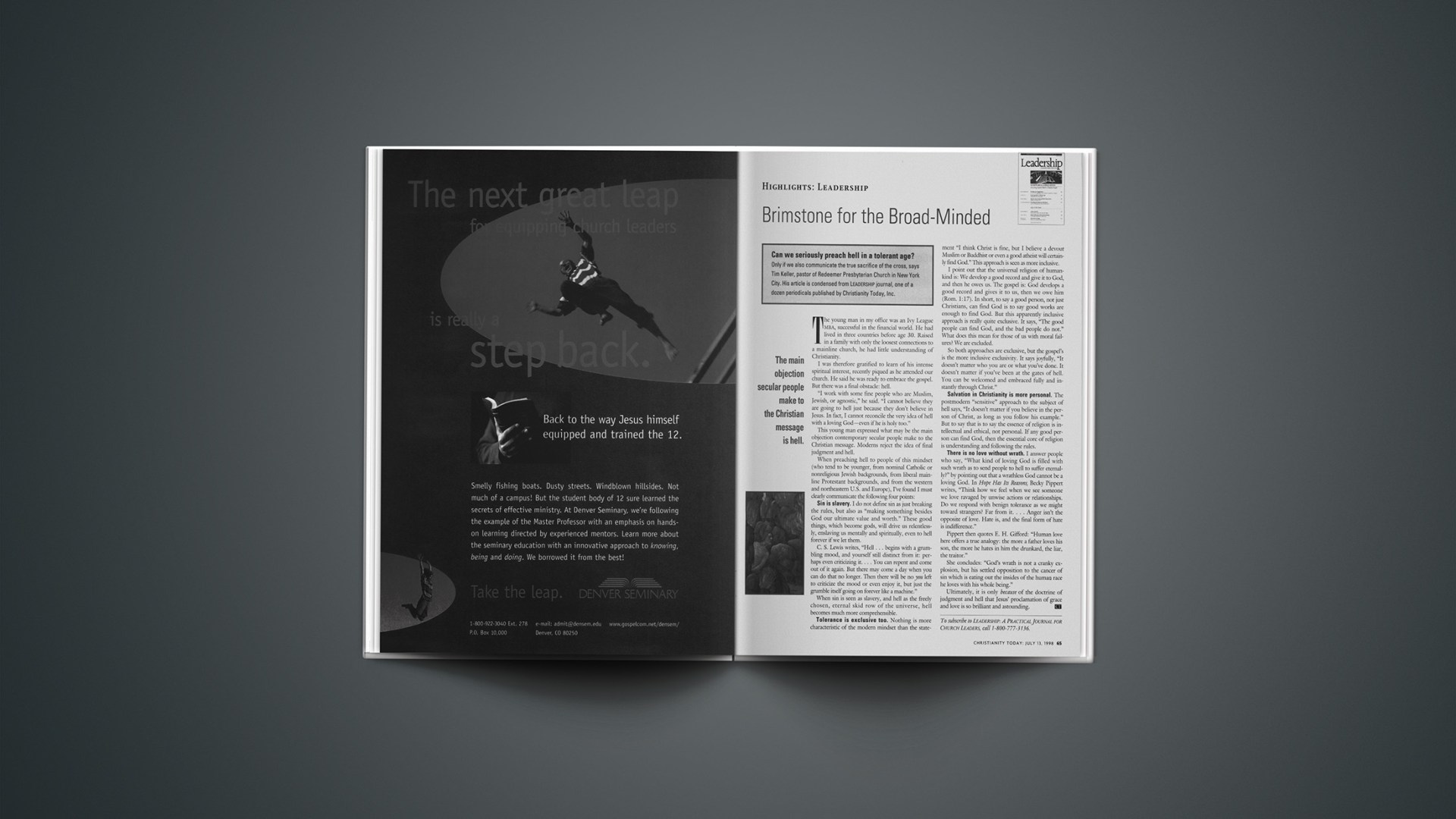Can we seriously preach hell in a tolerant age? Only if we also communicate the true sacrifice of the cross, says Tim Keller, pastor of Redeemer Presbyterian Church in New York City. His article is condensed from Leadership journal, one of a dozen periodicals published by Christianity Today International,
The young man in my office was an Ivy League mba, successful in the financial world. He had lived in three countries before age 30. Raised in a family with only the loosest connections to a mainline church, he had little understanding of Christianity.
I was therefore gratified to learn of his intense spiritual interest, recently piqued as he attended our church. He said he was ready to embrace the gospel. But there was a final obstacle: hell.
“I work with some fine people who are Muslim, Jewish, or agnostic,” he said. “I cannot believe they are going to hell just because they don’t believe in Jesus. In fact, I cannot reconcile the very idea of hell with a loving God—even if he is holy too.”
This young man expressed what may be the main objection contemporary secular people make to the Christian message. Moderns reject the idea of final judgment and hell.
When preaching hell to people of this mindset (who tend to be younger, from nominal Catholic or nonreligious Jewish backgrounds, from liberal mainline Protestant backgrounds, and from the western and northeastern U.S. and Europe), I’ve found I must clearly communicate the following four points:
Sin is slavery. I do not define sin as just breaking the rules, but also as “making something besides God our ultimate value and worth.” These good things, which become gods, will drive us relentlessly, enslaving us mentally and spiritually, even to hell forever if we let them.
C. S. Lewis writes, “Hell … begins with a grumbling mood, and yourself still distinct from it: perhaps even criticizing it. … You can repent and come out of it again. But there may come a day when you can do that no longer. Then there will be no you left to criticize the mood or even enjoy it, but just the grumble itself going on forever like a machine.”
When sin is seen as slavery, and hell as the freely chosen, eternal skid row of the universe, hell becomes much more comprehensible.
Tolerance is exclusive too. Nothing is more characteristic of the modern mindset than the statement “I think Christ is fine, but I believe a devout Muslim or Buddhist or even a good atheist will certainly find God.” This approach is seen as more inclusive.
I point out that the universal religion of humankind is: We develop a good record and give it to God, and then he owes us. The gospel is: God develops a good record and gives it to us, then we owe him (Rom. 1:17). In short, to say a good person, not just Christians, can find God is to say good works are enough to find God. But this apparently inclusive approach is really quite exclusive. It says, “The good people can find God, and the bad people do not.” What does this mean for those of us with moral failures? We are excluded.
So both approaches are exclusive, but the gospel’s is the more inclusive exclusivity. It says joyfully, “It doesn’t matter who you are or what you’ve done. It doesn’t matter if you’ve been at the gates of hell. You can be welcomed and embraced fully and instantly through Christ.”
Salvation in Christianity is more personal. The postmodern “sensitive” approach to the subject of hell says, “It doesn’t matter if you believe in the person of Christ, as long as you follow his example.” But to say that is to say the essence of religion is intellectual and ethical, not personal. If any good person can find God, then the essential core of religion is understanding and following the rules.
There is no love without wrath. I answer people who say, “What kind of loving God is filled with such wrath as to send people to hell to suffer eternally?” by pointing out that a wrathless God cannot be a loving God. In Hope Has Its Reasons, Becky Pippert writes, “Think how we feel when we see someone we love ravaged by unwise actions or relationships. Do we respond with benign tolerance as we might toward strangers? Far from it. … Anger isn’t the opposite of love. Hate is, and the final form of hate is indifference.”
Pippert then quotes E. H. Gifford: “Human love here offers a true analogy: the more a father loves his son, the more he hates in him the drunkard, the liar, the traitor.”
She concludes: “God’s wrath is not a cranky explosion, but his settled opposition to the cancer of sin which is eating out the insides of the human race he loves with his whole being.”
Ultimately, it is only because of the doctrine of judgment and hell that Jesus’ proclamation of grace and love is so brilliant and astounding.
To subscribe to LEADERSHIP: A PRACTICAL JOURNAL FOR CHURCH LEADERS, call 1-800-777-3136.
Copyright © 1998 Christianity Today. Click for reprint information.










